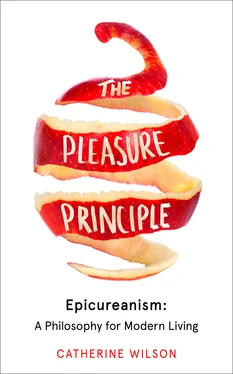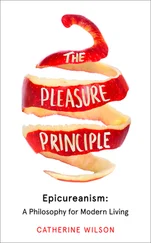By now it should be clear that it may be impossible from an engineering point of view to pack all these competencies into an unconscious machine operating on chips that is only the size of a Roomba, or to pack them into a unit the size of a mouse using only Roomba-type materials and structures. However the mouse is doing all that a Roomba does, it isn’t doing it with Roomba-type materials and structures, and it is probably conscious. The mouse’s ability to have experiences, to see, to recognise places and things, to remember locations, to make decisions, to choose mates, to feel the emotion of fear that enables it to avoid cats and boots, and the emotion of love that moves it to care for its young while they are small will make it an efficient and competitive organism. If evolution can tap into the laws of nature that make consciousness possible, the mouse will not need the fancy electronics and tremendous bulk and complexity that a foraging and reproducing robot would need if built with unconscious technology.
When we look at a human brain, a soft, lobular structure roughly the consistency of oatmeal, it is impossible to imagine it producing experiences and ideas. The case bears no comparison with, for example, looking at the liver, another soft, lobular structure, and wondering how it can produce liver enzymes; someone can no doubt explain this. Yet we know that the patterned excitation of the three trillion neurons in the average brain gives rise to what the neuroscientist Antonio Damasio calls ‘the feeling of what happens’. Perhaps this is accomplished through the classical mechanisms of physics and chemistry, but an emerging trend is to propose that evolution has tapped into quantum mechanics. If organisms can tap into the laws of hydrodynamics to swim and fly efficiently, and the laws of action and reaction to push off from the earth in locomotion; if they can use photons to see, and to organise their circadian rhythms, why should they not be able to tap into quantum mechanics to master some of the challenges of life?
We tend to think of consciousness as all or nothing. We suppose that either a conscious organism experiences the world just as I do or that it is just an insensate machine. But this must be wrong. There must be forms and degrees of consciousness that are only somewhat or hardly at all like mine, as well as forms that are very like mine. If the nervous system first evolved to co-ordinate movement, we can imagine that a side effect of having just a little bit of conscious awareness – perhaps for pain or scent – could give an early organism an advantage and that nature continued to add on as new ways of gathering information from the environment through light or sound or scent were invented and new perceptual and emotional motivations assisted with the tasks of living.
Philosophers and neuroscientists continue to debate whether consciousness is accidental or intrinsically useful, whether it extends to invertebrates like the bee or the oyster, and whether it is only present in animals with brains of a certain complexity. The Epicurean can only follow these debates with interest, never doubting that the mind is, at any rate, a natural thing whose existence is dependent on the smallest particles and subtlest forces of the physical world.
4
The human beings who lived on earth in those early days were far tougher than we are … [T]hey were not easily affected by heat or cold or unaccustomed food, or any physical malady. During many lustres of the sun revolving through the sky, they lived random-roving lives like wild beasts … What the sun and rains had given them, what the earth had spontaneously produced, were gifts rich enough to content their hearts.
Lucretius
Although they belonged to the highly developed civilisations of ancient Greece and Rome, the ancient Epicureans were fascinated by the recognition that human beings had not always lived in cities or practised farming, industry and commerce. They were aware that their ancestors had formerly lived in families and tribes with little political organisation. They understood that they had only later come together into federations, empowered kings and magistrates, and enacted laws and systems of punishment for offences and crimes. Relying on the manuscripts of Epicurus, as well as on the knowledge of his contemporaries about the distant past, Lucretius thought deeply about the origins of civilisation, and in the fifth book of On the Nature of Things he narrated the story of humanity, drawing important conclusions about technological progress, human happiness and political oppression that deserve our continued attention.
The State of Nature and the Rise of Civilisation
Lucretius describes the earliest phase of human life as dangerous but in many ways attractive. Adults lived as solitary foraging animals (presumably carrying or followed by their children). Many were ‘caught by wild beasts and provided them with living food for their teeth to tear’, while others died of their wounds ‘as no one knew anything of medicine’. But, says Lucretius pointedly, ‘Never in those times did a single day consign to destruction many thousands of men marching beneath military standards; never did the boisterous billows of the ocean dash ships and sailors upon the rocks.’ People died of famine, but not of surfeit; they got poisoned accidentally from eating the wrong thing, whereas ‘nowadays they make away with themselves more expertly’.
Fire was not stolen from the gods, as the Greek myth of Prometheus had it, nor was it a divine gift. Rather, Lucretius explains, forest fires were frequent in those early days, caused by lightning or the friction of tree branches rubbing against one another. People figured out how to capture, control and preserve fire, and this marked a turning point. They grew used to warmth and drew together to live as families in huts. They learned to cook their food, and living with women and children made men gentler and more obliging. Human language, which Lucretius saw as just another form of animal language, was invented, along with crafts such as plaiting and weaving. Although they fought with stones and clubs, early humans could not do each other much damage. There was relative equality and relative freedom without priests and judges to lay down the laws and threaten punishment.
Lucretius’s reconstruction has been largely validated by archaeologists and students of the few remaining hunter-gatherer societies. Anthropologists have noted the ‘preference for equality’ in small and simple societies and the resentment of anyone who begins to act in an aggressive manner. There may be a headman in larger tribal societies, but his main function is to negotiate with outsiders, not to make rules for insiders, and he does not normally distinguish himself in dwelling or dress. How, then, did human beings make the transition from living in small, relatively egalitarian groups to oligarchies and imperial bureaucracies? In these political structures, wealth and power are concentrated in a small number of hands, and a very few rulers make decisions affecting the experiences and even the survival of millions of their subjects. For, as Lucretius emphasises, though he perhaps exaggerates the uninterrupted harmony of archaic life, warfare was unknown. All motivation to attack the neighbours was lacking, as well as effective weapons for doing so.
Lucretius is vague about how this happened. He supposes that ‘those endowed with exceptional talents and mental power’ invented new and admired practices and that kings appeared who rewarded their favourites and built cities. The invention of money brought in a new political era. ‘Later, wealth was invented and gold discovered, [which] robbed the strong and handsome of their prestige; for as a general rule … people … follow in the train of the rich.’
Читать дальше












